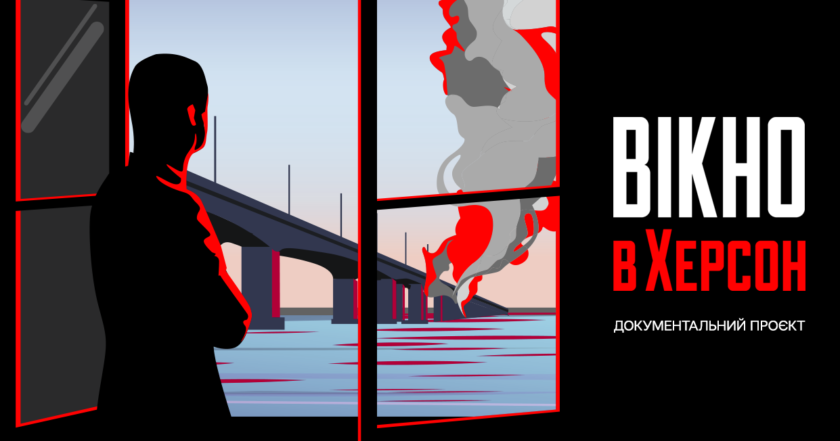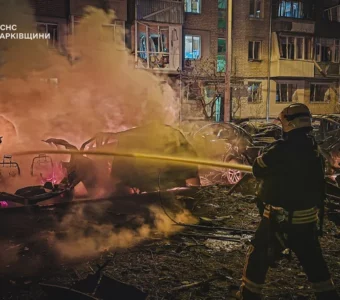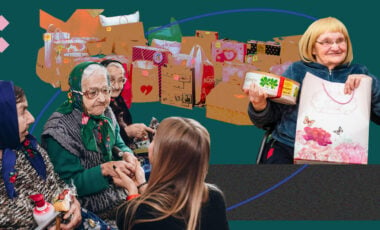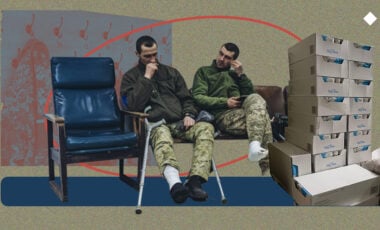"Window to Kherson" premieres today, documenting city's occupation and liberation with eyewitness testimony

Host of Ukrainian Radio Liudmila Tiahnyriadno, together with director Eduard Skrypnyk, with the support of Rubryka and Freedom House Ukraine, presents the documentary project "Window to Kherson."
A year ago, on March 13, when russian forces had already captured the southern city of Kherson, the largest pro-Ukrainian rally against the russian occupation took place in the city. At that time, thousands of unarmed citizens took to the streets of Kherson for the "Kherson is Ukraine" rally, demanding that the occupiers leave the city. In response, the russian military opened fire on the protesters.
The protagonist of the documentary project "Window to Kherson" is a historian and senior researcher at the Institute of History and Archeology of the Baltic Region, Artem Petryk. He visited his parents in the city and found himself in occupation. To survive, he hid and documented the war crimes of the russian military. Artem Petryk also kept a diary during the occupation, describing the townspeople's life under the muzzles of russian machine guns.
"Kherson is the only regional center that the russian military managed to occupy for a certain time. Despite the hopes of the occupiers to subjugate, intimidate, and break the active citizens, the city did not give up and responded first with mass protests and later with a partisan resistance movement," says the producer of the documentary project "Window to Kherson" Liudmila Tyaunyriadno. "Thousands of people joined the resistance at their own peril and risk. It was important for our team to document the testimony of an eyewitness to the events so that it would become the evidence in cases of punishment of those guilty of these war crimes in the future."
The film comprises five parts: invasion, resistance, repression, underground, and liberation. These are the stages of life during the occupation that Ukrainians in Kherson experienced. Artem Petryk, looking out of his Kherson window, witnesses historical events, draws parallels with the past, and describes what he saw in his diary. He conveys the mood and attitude of the people of Kherson towards the occupiers, talks about the heroic defense of the city by territorial defense, describes the resistance of the people of Kherson, talks about the torture and repression committed by the russian military against pro-Ukrainian citizens, recalls how the city waited for liberation and how citizens met the Armed Forces of Ukraine.
"The story about the occupation of Kherson is about what people experienced when the russian army came to them — a story about the strength of spirit and faith, the story about this war as the survival of not just a country, a city, or a village but the whole of Ukraine as such. Each of us now has a choice. Only resistance gives us a chance to remain Ukrainian," says Eduard Skrypnyk, director of the documentary project "Window to Kherson."
Rubryka's editor-in-chief, Anastasia Rudenko, says the "Window to Kherson" documentary project is a logical continuation of the "Whistleblowers" project, which was dedicated to activists and citizens exposing injustice, corruption, and abuse of power.
"After the full-scale invasion, the editors and the author of the project, Liudmila Tyagnyriadno, decided to shift the focus of the Whistleblowers to a new vector — documenting the crimes of the russian military so that justice prevails and the guilty are punished. So we decided to make a high-quality documentary project with evidence of russian crimes in temporarily occupied Kherson," the editor-in-chief of Rubryka Anastasia Rudenko adds. "We also wrote articles about the "quiet" but hellish occupation, such as "Kherson is screaming, but no one's listening? What's going on in southern Ukraine's occupied region?" and our photojournalist was one of the first documenting the liberated Kherson. Immediately after city liberation, Liudmila began filming a project dedicated to Kherson. Rubryka is a media of solutions, but the investigations will strengthen the voice of Ukrainians in the international arena and tell the world what crimes the russian occupiers committed in Ukraine."
You can view the documentary project on YouTube.
And also on Rubryka's Facebook page.



















































